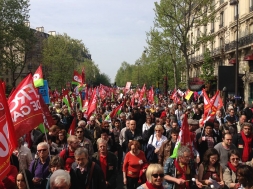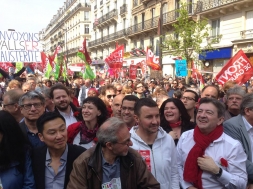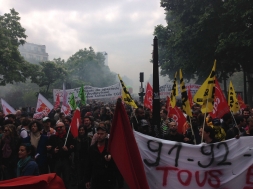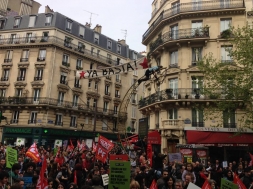





 Textes politiques, tribunes
Textes politiques, tribunes14sept 15
Os signatários:
Jean-Luc Mélenchon, deputado europeu, co-fundador do Parti de Gauche (França)
Stefano Fassina, deputado, ex-Vice-Ministro da Economia e Finanças (Itália)
Zoe Konstantopoulou, presidente do Parlamento Grego (Grécia)
Oskar Lafontaine, ex-ministro das Finanças, co-fundador do Die Linke (Alemanha)
Yanis Varoufakis, deputado, ex-Ministro das Finanças (Grécia)
A 13 de julho, o governo grego democraticamente eleito de Alexis Tsipras foi posto de joelhos pela União Europeia. "O acordo" de 13 de julho é, na verdade, um golpe de Estado. Foi obtido através do encerramento dos bancos gregos pelo Banco Central Europeu (BCE) e a ameaça de não permitir que estes voltassem a reabrir caso o governo grego não aceitasse uma nova versão de um programa que falhou. Porquê? Porque a Europa oficial não podia suportar a ideia de que um povo com o seu programa de austeridade autodestrutivo tenha ousado eleger um governo determinado a dizer "Não! ".
Agora, com mais austeridade, mais privatizações de bens públicos a preço de saldo, uma política económica mais irracional do que nunca, e misantropia como política social, o novo memorando serve somente para exacerbar a Grande Depressão grega e a pilhagem da Grécia por interesses particulares, gregos ou não.
Devemos aprender com este golpe de Estado financeiro. Este euro tornou-se o instrumento de dominação económica e política da oligarquia europeia, escondido atrás do Governo alemão e que se regozija por ver a Sra Merkel fazer todo o "trabalho sujo" que os outros governos não são capazes de fazer. Esta Europa só produz violência dentro e entre as nações: o desemprego em massa, dumping social feroz, insultos atribuídos aos líderes alemães contra a Europa do Sul e repetidas por todas as "elites", incluindo as daqueles países. A União Europeia alimenta a ascensão da extrema-direita e tornou-se um meio de anular o controlo democrático sobre a produção e distribuição da riqueza em toda a Europa.
Afirmar que o euro e a União Europeia servem os europeus e protegem-nos contra a crise é uma mentira perigosa. É uma ilusão acreditar que os interesses da Europa podem ser protegidos no âmbito da prisão das regras da zona euro e os atuais tratados. O método Holland-Renzi do "bom aluno", na realidade, do prisioneiro modelo, é uma forma de rendição que nem sequer obterá clemência. O presidente da Comissão Europeia, Jean-Claude Juncker, disse-o claramente: "não podem existir escolhas democráticas contra os tratados europeus". É a adaptação neoliberal de "soberania limitada" inventada pelo líder soviético Leonid Brejnev em 1968. À época, os soviéticos esmagaram a Primavera de Praga pelos tanques. Este verão, a União Europeia esmagou a Primavera de Atenas pelos bancos.
Estamos determinados a romper com esta Europa. É a condição para reconstruir redes de cooperação entre os nossos povos e os nossos países sobre uma nova base. Como conduzir uma política de redistribuição da riqueza e criação de emprego, particularmente para os jovens, de transição ecológica e de refundação democrática face a esta União Europeia? Temos que escapar da inanidade e desumanidade dos tratados europeus e refundá-los por forma a remover a camisa de força do neoliberalismo, revogar o tratado orçamental, recusar o tratado de livre comércio com os Estados Unidos (TTIP).
O período é extraordinário. Enfrentamos uma emergência. Os Estados-Membros devem ter o espaço político que permite às suas democracias respirar e implementar as políticas adequadas a nível nacional, sem medo de serem impedidos por um Eurogrupo autoritário dominado pelos interesses dos mais fortes dos Estados-Membros e do mundo dos negócios, ou por um BCE usado como um rolo compressor ameaçando esmagar todos os "países não cooperantes", como foi o caso do Chipre ou da Grécia.
Este é o nosso Plano A: trabalhar em cada um dos nossos países, e juntos em toda a Europa, por uma renegociação completa dos tratados europeus. Estamos empenhados em colaborar com a luta dos europeus em todos os lugares, numa campanha de desobediência às práticas europeias arbitrárias e às regras irracionais até que a renegociação seja bem-sucedida.
A nossa primeira tarefa é acabar com a irresponsabilidade do Eurogrupo. A segunda tarefa é acabar com a ilusão de que o Banco Central é "independente" e "apolítico", quando este é altamente politizado (da forma mais tóxica), totalmente dependente de banqueiros falidos e dos seus agentes políticos e pronto para acabar com a democracia com um simples toque de botão.
A maioria dos governos, que representam a oligarquia europeia e escondem-se atrás de Berlim e Frankfurt, também tem um plano A: não ceder às exigências de democracia dos cidadãos europeus e usar a repressão para acabar com a resistência. Vimo-lo na Grécia em julho. Por que conseguiram estrangular o governo democraticamente eleito da Grécia? Porque também tinham um plano B: empurrar a Grécia para fora da zona euro nas piores condições possíveis, destruindo o seu sistema bancário e acabando com a sua economia.
Confrontados com esta chantagem, precisamos do nosso próprio Plano B para dissuadir as forças mais reacionárias e anti-democráticas da Europa. Para reforçar a nossa posição contra o seu compromisso brutal com políticas que sacrificam a maioria a favor dos interesses de uma pequena minoria. Mas também para reafirmar o princípio simples de que a Europa não é nada mais do que os europeus e que as moedas são ferramentas de apoio à prosperidade compartilhada, e não instrumentos de tortura ou armas para assassinar a democracia. Se o euro não pode ser democratizado, se continuam a usá-lo para estrangular o povo, vamos elevar-nos, vamos olhar nos seus olhos e vamos dizer-lhes: "Experimentem, para ver! As vossas ameaças não nos assustam. Vamos encontrar uma forma de assegurar aos europeus um sistema monetário que trabalha com eles, e não à sua custa ".
O nosso plano A para uma Europa democrática, apoiado por um Plano B, que mostra que aqueles que detêm o poder não podem aterrorizar-nos até à submissão, visa apelar à maioria dos europeus. Isto requer um elevado nível de preparação. Os elementos técnicos serão enriquecidos pelo debate. Muitas ideias já estão na mesa: a introdução de sistemas de pagamento alternativos, moedas alternativas, digitalização de transações em euros para contornar a falta de liquidez, sistemas de intercâmbio complementares em torno de uma comunidade, a saída do euro e a conversão do euro em moeda comum.
Nenhuma nação europeia pode avançar para a sua libertação isoladamente. A nossa visão é internacionalista. Prevendo o que pode acontecer em Espanha, na Irlanda, e porque não novamente na Grécia face à evolução da situação política, e em França em 2017, temos de trabalhar juntos num plano B tendo em conta as características de cada país.
Propomos, portanto, a realização de uma cimeira internacional para um plano B na Europa, aberta a cidadãos voluntários, organizações e intelectuais. Esta conferência poderá ter lugar em novembro de 2015. Vamos lançar este processo no sábado, dia 12 de setembro, no Festival da Humanidade. Junte-se a nós!
14sept 15
Unterzeichner :
Jean-Luc Mélenchon, Mitglied des Europäischen Parlaments, Mitbegründer der Parti de Gauche (Frankreich)
Stefano Fassina, Abgeordneter, ehemaliger Vize Finanz- und Wirtschaftsminister (Italien)
Zoe Konstantopoulou, Präsidentin des griechischen Parlaments (Griechenland)
Oskar Lafontaine, ehemaliger Finanzminister, Mitbegründer der Linke (Deutschland)
Yanis Varoufakis, Abgeordneter, ehemaliger Finanzminister (Griechenland)
Am 13. Juli wurde die demokratisch gewählte griechische Regierung von Alexis Tsipras durch die Europäische Union in die Knie gezwungen. Die „Einigung“ vom 13. Juli ist ein Staatsstreich. Sie wurde dadurch erreicht, dass die Europäische Zentralbank die Schließung der griechischen Banken erzwang und drohte, diese nicht wieder öffnen zu lassen, bis die griechische Regierung eine neue Version eines gescheiterten Programms akzeptiert. Warum? Weil das offizielle Europa die Idee nicht ertragen konnte, dass ein Volk, das unter einem zerstörerischen Austeritätsprogamm leidet, es wagt, eine Regierung zu wählen, die entschlossen „Nein“ sagt.
Durch mehr Austerität, zusätzlichen Ausverkauf öffentlichen Eigentums, größerer Irrationalität im Bereich der Wirtschaftspolitik als je zuvor, und massiver Menschenverachtung im Bereich der Sozialpolitik, wird das neue Memorandum nur dazu dienen, Griechenlands große Depression zu verschlimmern und Griechenlands Reichtum nicht-griechischen und griechischen Oligarchen zur Beute zu machen.
Aus diesem Finanz-Staatsstreich müssen wir unsere Lehren ziehen. Der Euro ist das Werkzeug politischer und ökonomischer Dominanz einer kleinen europäischen Elite geworden. Diese Oligarchie versteckt sich hinter der deutschen Regierung, erfreut darüber, dass Frau Merkel all die Schmutzarbeit macht, zu der andere Regierungen unfähig sind. Dieses Europa schafft Verletzungen, sowohl innerhalb der Länder, als auch zwischen ihnen: Massenarbeitslosigkeit, scharfes Sozialdumping und Beleidigungen gegen die europäische Peripherie, die der deutschen Führung zugeschrieben werden, aber von allen „Eliten“, auch denen der Peripherie, nachgeplappert werden. Die Europäische Union ist so zur Vertreterin eines extrem rechten Ethos geworden sowie zu einem Werkzeug, um demokratische Kontrolle über Produktion und Verteilung in Europa auszuhebeln.
Es ist eine gefährliche Lüge, zu behaupten, dass der Euro und die EU den Europäerinnen und Europäern dienen und sie von Krisen abschirmen würden. Es ist eine Illusion zu glauben, dass Europas Interessen im eisernen Käfig aus den Regeln der Eurozone und den europäischen Verträgen geschützt werden könnten. Die Methode Präsident Hollandes und Ministerpräsident Renzis, sich wie Musterschüler, oder tatsächlich wie „Mustergefangene“ zu verhalten, ist eine Form der Kapitulation, die nicht mal Milde finden wird. EU-Kommissionspräsident Jean-Claude Juncker hat es klar gesagt: „Es kann keine demokratische Wahl gegen die europäischen Verträge geben“. Das ist die neoliberale Adaption der Doktrin der „beschränkten Souveränität“, erfunden von Breschnew in 1968. Damals haben die Sowjets den Prager Frühling mit ihren Panzern niedergeschlagen. Diesen Sommer hat die EU den Athener Frühling mit ihren Banken zerschlagen.
Wir sind entschlossen mit diesem „Europa“ zu brechen. Das ist die Grundvoraussetzung dafür, die Zusammenarbeit zwischen unseren Völkern und Ländern auf neuer Basis wiederaufzurichten. Wie können wir eine Politik umsetzen, die gute Arbeitsplätze vor allem für junge Menschen schafft, die Wohlstand umverteilt, eine ökologische Wende herbeiführt und die Demokratie wieder herstellt, in den Beschränkungen dieser EU? Wir müssen dem Irrsinn und der Unmenschlichkeit der aktuellen europäischen Verträge entkommen und sie von Grund erneuern, um die Zwangsjacke des Neoliberalismus abzustreifen, den Fiskalpakt aufzuheben und TTIP zu verhindern.
Wir leben in außergewöhnlichen Zeiten und sind mit einer wahrhaften Notlage konfrontiert. Die Demokratien der Mitgliedsstaaten brauchen Luft zum Atmen und den politischen Raum, der ihnen die Möglichkeit gibt, sinnvolle Politik auf einzelstaatlicher Ebene voranzubringen, ohne Angst vor dem harten Eingreifen einer autoritären Eurogruppe, dominiert von den Interessen des stärksten Mitgliedsstaates und von Großkonzernen, oder einer EZB, die als Dampfwalze droht, jedes „unkooperative Land“ niederzuwalzen, wie mit Zypern und Griechenland geschehen.
Dies ist unser Plan A: Wir werden alle in unseren Ländern, und alle zusammen überall in Europa, auf eine vollständige Neuverhandlung der europäischen Verträge hinarbeiten. Bis diese Neuverhandlung erreicht ist, beteiligen wir uns in einer Kampagne des europäischen zivilen Ungehorsams gegenüber willkürlichen, europäischen Praktiken und irrationalen „Regeln“ an den Kämpfen der Europäerinnen und Europäer überall in Europa.
Zu allererst muss die Eurogruppe rechenschaftspflichtig gemacht werden. Zudem muss die Mär beendet werden, dass die EZB „unpolitisch“ und „unabhängig“ wäre, wenn sie (auf schädlichste Weise) höchst politisch agiert, vollständig abhängig von bankrotten Bankern und deren politischen Handlangern, und bereit ist, Demokratie mit einem Knopfdruck zu beenden.
Die Mehrheit der Regierungen, die die europäische Oligarchie repräsentieren und sich hinter Berlin und Frankfurt verstecken, haben ebenfalls einen Plan A: Statt der Forderung der Menschen Europas nach Demokratie nachzugeben deren Widerstand brutal zu beenden, wie im Juli in Griechenland geschehen. Warum haben sie es geschafft, einer demokratisch gewählten Regierung die Luft abzuschneiden? Weil sie auch einen Plan B hatten: Griechenland im schlechtesten möglichen Zustand aus der Eurozone zu werfen, indem das Bankensystem zerstört und die Wirtschaft zum Stillstand gebracht wurden.
Angesichts dieser Erpressung benötigen wir unseren eigenen Plan B als Abschreckung gegen den Plan B, den Europas reaktionärste und anti-demokratische Kräfte verfolgen. Dies ist zur Stärkung unserer Position notwendig, im Angesicht ihres brutalen Bekenntnisses, zu einer Politik, die die Mehrheit im Interesse einer kleinen Minderheit opfert. Aber auch, um dem einfachen Prinzip neue Geltung zu verschaffen, dass Europa den Interessen der Europäerinnen und Europäern dienen muss und dass Währungen Werkzeuge sind, um den gemeinsamen Wohlstand zu mehren, nicht Folterinstrumente oder Waffen zur Abschaffung der Demokratie: Wenn der Euro nicht demokratisiert werden kann, wenn sie weiter darauf bestehen, den Menschen die Luft abzuschnüren, dann werden wir uns erheben und ihnen in die Augen sehen und sagen: Versucht es nur! Eure Drohungen ängstigen uns nicht. Wir werden einen Weg finden, um sicherzustellen, dass die Europäerinnen und Europäer ein Geldsystem haben, das für sie arbeitet, nicht gegen sie.
Unser Plan A für ein demokratisches Europa, gestützt durch einen Plan B, der den Mächtigen zeigt, dass sie uns durch ihre Erpressung nicht unterwerfen können, ist offen und zielt darauf, die Mehrheit der Europäerinnen und Europäer anzusprechen. Dies erfordert ein hohes Maß an Vorbereitung. Die Debatte wird die technischen Elemente verstärken. Viele Ideen gibt es bereits: Die Einführung eines parallelen Zahlungssystems, Parallelwährungen, digitalisierte Eurotransaktionen, ein Austritt aus der Eurozone sowie die Umwandlung des Euro in eine (demokratische) Gemeinschaftswährung.
Kein europäisches Land kann sich in Isolation befreien. Unsere Vision ist internationalistisch. In Erwartung dessen, was in Spanien, Irland – möglicherweise wieder in Griechenland, abhängig von der Entwicklung der dortigen politischen Situation – und in Frankreich 2017 passieren könnte, müssen wir auf einen konkreten Plan B hinarbeiten, unter Berücksichtigung der Besonderheiten in jedem einzelnen Land.
Wir schlagen deshalb vor, einen internationalen Gipfel für einen Plan B für Europa einzuberufen, der allen interessierten Bürgerinnen und Bürgern, Organisationen und Intellektuellen offen steht. Diese Konferenz könnte bereits im November 2015 stattfinden. Wir werden den Prozess am Samstag, den 12. September, während der Fête de l'Humanité in Paris beginnen. Schließen Sie sich uns an!
11sept 15
Signataires :
Jean-Luc Mélenchon, député européen, co-fondateur du Parti de Gauche (France)
Stefano Fassina, député, ancien vice-ministre de l’Economie et des Finances (Italie)
Zoe Konstantopoulou, présidente du Parlement hellénique (Grèce)
Oskar Lafontaine, ancien ministre des Finances, co-fondateur de Die Linke (Allemagne)
Yanis Varoufakis, député, ancien ministre des Finances (Grèce)
For the English version, click here.
Per leggere in italiano, clicca qui.
Auf Deutsch lesen, klicken Sie hier.
Para leer en español, haga clic aquí.
Para ler em Português, clique aqui.
Чтобы прочитать на русском, нажмите здесь.
Για να διαβάσετε στα ελληνικά, πατήστε εδώ.
Če želite prebrati v slovenščini, kliknite tukaj.
Le 13 juillet, le gouvernement grec démocratiquement élu d’Alexis Tsipras a été mis à genoux par l’Union européenne. « L’accord » du 13 juillet est en réalité un coup d’Etat. Il a été obtenu par la fermeture des banques grecques par la Banque centrale européenne (BCE) et la menace de ne pas les autoriser à rouvrir tant que le gouvernement grec n’accepterait pas une nouvelle version d’un programme qui a échoué. Pourquoi ? Parce que l'Europe officielle ne pouvait pas supporter l'idée qu’un peuple souffrant de son programme d'austérité autodestructrice ait osé élire un gouvernement déterminé à dire « Non ! ».
11sept 15
By :
Jean-Luc Mélenchon, Member of the European Parliament, co-founder of the Parti de Gauche (France)
Stefano Fassina, Member of the Italian Parliament, former Italian deputy minister of economy and finance (Italy)
Zoe Konstantopoulou, President of the Hellenic parliament (Greece)
Oskar Lafontaine, former German minister of finance, founder of Die Linke (Germany)
Yanis Varoufakis, Member of the Greek Parliament, former Greek minister of finance (Greece)
La version française peut être consultée en cliquant ici.
Per leggere in Italiano, clicca qui.
On 13th July, the democratic elected Greek government of Alexis Tsipras was brought to its knees by the European Union. The “agreement” of 13th of July is in fact a coup d’état. It was obtained by having the European Central Bank close down the Greek banks and threaten never to allow them to open up again, until the Greek government accepted a new version of a failed program. Why? Because official Europe could not stand the idea that a people suffering from its self-defeating austerity program dared elect a government determined to say “No!”.
Now, with more austerity, more fire sales of public assets, greater irrationality than ever in the sphere of economic policy, and massive fresh misanthropy in the realm social policy, the new Memorandum of Understanding only serves to worsen Greece’s Great Depression and to loot Greece’s wealth by vested interests, non-Greek and Greek alike.
We must learn from this financial coup. The euro has become the tool of economic and governmental dominance in Europe by a European oligarchy hiding behind the German government, delighted to see Mrs Merkel doing all the "dirty work" other governments are incapable of undertaking. This Europe only generates violence within nations and between them: mass unemployment, fierce social dumping and insults against the European Periphery that are attributed to Germany’s leadership while parroted by all the “elites”, the Periphery’s not excluded. The European Union has thus become an agent of an extreme right wing ethos and a vehicle for annulling democratic control over production and distribution throughout Europe.
It is a dangerous lie to assert that the euro and the EU serve Europeans and shield them from crisis. It is an illusion to believe that Europe’s interests can be protected within the iron cage of the Eurozone’s governance “rules” and within the current Treaties. President Hollande's and Prime Minister Renzi's method of behaving like a “model student”, or in fact a “model prisoner”, is a form of surrender that will not even result in clemency. The President of the European Commission, Jean-Claude Juncker, said it clearly: "there can be no democratic choice against the European treaties". This is the neoliberal adaptation of the "limited sovereignty" doctrine invented by the Soviet leader Brezhnev in 1968. Then, the Soviets crushed the Prague Spring with their tanks. This summer, the EU crushed the Athens Spring with its banks.
We are determined to break with this “Europe”. It is the basic condition needed to rebuild cooperation between our peoples and our countries on a new basis. How can we enact policies of redistribution of wealth and of creation of decent jobs, especially for the young, ecological transition and the rebuilding of democracy within the constraints of this EU? We have to escape the inanity and inhumanity of the current European Treaties and remould them in order to shed the straightjacket of neoliberalism, to repeal the Fiscal Compact, and to oppose the TTIP.
We live in extraordinary times. We are facing an emergency. Member-states need to have policy space that allows their democracies to breathe and to put forward sensible policies at the member-state’s level, free of fear of a clamp down from an authoritarian Eurogroup dominated by the interests of the strongest among them and of big business, or from an ECB that is used as a steamroller that threatens to flatten an “uncooperative country”, as it happened with Cyprus or Greece.
This is our plan A: We shall work in each of our countries, and all together throughout Europe, towards a complete renegotiation of the European Treaties. We commit to engage with the struggle of Europeans everywhere in a campaign of Civil European disobedience toward arbitrary European practices and irrational “rules” until that renegotiation is achieved.
Our first task is to end the unaccountability of the Eurogroup. The second task is to end the pretence that the ECB is “apolitical” and “independent”, when it is highly political (of the most toxic form), fully dependent on bankrupt bankers and their political agents, and ready to end democracy at the touch of a button.
The majority of governments representing Europe’s oligarchy, and hiding behind Berlin and Frankfurt, also have a plan A: Not to yield to the European people’s demand for democracy and to use brutality to end their resistance. We've seen this in Greece last July. Why did they manage to strangle Greece’s democratically elected government? Because they also had a plan B: To eject Greece from the Eurozone in the worst conditions possible by destroying its banking system and putting to death its economy.
Facing this blackmail, we also need a plan B of our own to deter the plan B of Europe’s most reactionary and anti-democratic forces. To reinforce our position in the face of their brutal commitment to policies that sacrifice the majority to the interests of a tiny minority. But also to re-assert the simple principle that Europe is about Europeans and that currencies are tools for promoting shared prosperity, not instruments of torture or weapons by which to murder democracy. If the euro cannot be democratised, if they insist on using it to strangle the people, we will rise up, look at them in the eye, and tell them: Do your worst! Your threats don’t scare us. We shall find a way of ensuring that Europeans have a monetary system that works with them, not at their expense.
Our Plan A for a democratic Europe, backed with a Plan B which shows the powers-that-be that they cannot terrorise us into submission, is inclusive and aims at appealing to the majority of Europeans. This demands a high level of preparation. Debate will strengthen its technical elements. Many ideas are already on the table: the introduction of parallel payment systems, parallel currencies, digitization of euro transactions, community based exchange systems, the euro exit and transformation of the euro into a common currency.
No European nation can work towards its liberation in isolation. Our vision is internationalist. In anticipation of what may happen in Spain, Ireland – and potentially again in Greece, depending on how the political situation evolves – and in France in 2017, we need to work together concretely towards a plan B, taking into account the different characteristics of each country.
We therefore propose the convening of an international summit on a plan B for Europe, open to willing citizens, organisations and intellectuals. This conference could take place as early as November 2015. We shall begin the process on Saturday the 12th of September during the Fête de l'Humanité in Paris. Do join us !
11sept 15
Firmatari :
Stefano Fassina, parlamentare, ex vice-ministro dell'economa e finanze (Italia)
Oskar Lafontaine, ex ministro delle finanze, fondatore del partito Die Linke (Germania)
Jean-Luc Mélenchon, parlamentare europeo, co-fondatore del Parti de Gauche (Francia)
Yanis Varoufakis, parlamentare, ex ministro delle finanze (Grecia)
Zoe Konstantopoulou, presidente del Parlamento Greco (Grecia)
For the English version, click here.
Pour la version française, cliquez ici.
Il 13 luglio scorso, il governo democraticamente eletto di Alexis Tsipras è stato messo in ginocchio dall'Unione Europea. “L'accordo” del 13 luglio è stato in realtà un coup d'État, messo in atto attraverso la chiusura delle banche greche provocata dalla Banca centrale europea, con la minaccia che non sarebbero state riaperte finché il governo non avesse accettato una nuova versione di quel fallimentare programma. Il motivo? L'Europa ufficiale non poteva tollerare che un popolo prostrato dalle sue politiche di austerità auto-distruttiva osasse eleggere un governo determinato a dire “No!”.
Ora, con più austerità, più svendite di beni pubblici, con politiche economiche sempre più irrazionali e politiche sociali improntate ad una sfacciata misantropia di massa, il nuovo Memorandum può servire solo a peggiorare la Grande Depressione in Grecia e a consentire che la ricchezza della Grecia sia saccheggiata a vantaggio di interessi privati interni ed esterni.
Da questo golpe finanziario dobbiamo trarre una lezione. L'euro è diventato uno strumento di dominio economico e politico da parte di un'oligarchia europea che si fa schermo del governo tedesco, ben contenta di lasciare alla cancelliera Merkel il lavoro sporco che gli altri governi non sono capaci di compiere. Questa Europa genera soltanto violenza nei paesi e tra di essi: disoccupazione di massa, brutale dumping sociale e insulti contro la periferia europea, attribuiti alla leadership tedesca ma in realtà ripetuti a pappagallo da tutte le élite europee, incluse quelle della stessa periferia. In questo modo, l'Unione europea alimenta l'avanzata dell'estrema destra e rende impossibile in Europa il controllo democratico sulla produzione e la distribuzione della ricchezza.
Che l'euro e l'UE difendano gli europei dalla crisi è oggi un'affermazione pericolosamente falsa. È un'illusione credere che gli interessi dell'Europa possano essere protetti entro la gabbia di ferro delle regole di governance dell'eurozona ed entro i Trattati vigenti. L'approccio Hollande-Renzi, comportarsi come studenti modello, o piuttosto prigionieri modello, è una forma di resa che non porterà nemmeno alla clemenza. Il presidente della Commissione europea, Jean-Claude Juncker, lo ha detto chiaramente: “non può esserci scelta democratica che vada contro i trattati europei”. È la versione neoliberista della dottrina della sovranità limitata inventata da Breznev nel 1968: allora, i sovietici repressero la primavera di Praga con i carri armati; questa estate, l'UE ha represso la primavera di Atene con le sue banche.
Siamo determinati a rompere con questa Europa. È la condizione primaria per ricostruire la cooperazione tra i nostri popoli e i nostri paesi su nuove basi. Come possiamo mettere in atto politiche di redistribuzione della ricchezza, di creazione di opportunità di lavoro dignitoso, specialmente per i giovani, di transizione ecologica, di ricostruzione della partecipazione democratica entro i vincoli di questa UE? Dobbiamo sfuggire alla vacuità e disumanità dei trattati europei vigenti e rimodellarli in modo da levarci di dosso la camicia di forza del neoliberismo, abolire il Fiscal compact e opporci al trattato commerciale con gli Stati Uniti, il TTIP.
Viviamo tempi eccezionali. Stiamo affrontando un'emergenza. Gli stati membri hanno bisogno dello spazio politico che consenta alle loro democrazie di respirare e avanzare soluzioni adeguate alle esigenze nazionali, senza il timore di giri di vite da parte di un Eurogruppo autoritario e dominato dai paesi più forti e dai grandi poteri economici, o da parte di una BCE utilizzata come un rullo compressore, che minaccia di schiacciare i paesi che non “cooperano”, come è accaduto con Cipro e con la Grecia.
Questo è il nostro piano A: lavoreremo nei nostri rispettivi paesi, e insieme in Europa, per una totale rinegoziazione dei trattati europei. Ci impegniamo a sostenere ovunque le lotte dei cittadini europei, con una campagna di disobbedienza civile contro le scelte europee arbitrarie e le “regole” irrazionali, finché tale rinegoziazione non sia ottenuta.
Il nostro primo obiettivo sarà porre fine all'irresponsabilità dell'Eurogruppo. Il secondo sarà rimuovere la finzione di una BCE “apolitica” e “indipendente”, quando in realtà essa è profondamente politica (nella forma più deleteria) e totalmente dipendente dagli interessi delle banche e dei loro rappresentanti politici, pronta come è a reprimere la democrazia con la semplice pressione di un bottone.
Anche i governi che rappresentano gli interessi dell'oligarchia europea, e che si nascondono dietro a Berlino e Francoforte, hanno un loro piano A: non cedere alla domanda di democrazia dei popoli europei e agire in modo brutale per piegare la loro resistenza. Lo abbiamo visto in Grecia lo scorso luglio. Come sono riusciti a strangolare il governo greco, democraticamente eletto? Dotandosi di un piano B: espellere la Grecia dall'eurozona nelle peggiori condizioni possibili, distruggendo il suo sistema bancario e uccidendo la sua economia.
Di fronte a questo ricatto, anche noi abbiamo bisogno di un nostro piano B, da opporre al piano B delle forze più reazionarie e anti-democratiche. Per rinforzare la nostra posizione negoziale di fronte a politiche brutali che sacrificano gli interessi della maggioranza per favorire un'esigua minoranza. Ma anche per riaffermare il semplice principio che l'Europa è per gli europei, e le valute sono strumenti per promuovere la prosperità diffusa, non strumenti di tortura o armi per uccidere la democrazia. Se l'euro non potrà essere democratizzato, se insisteranno nel volerlo usare per strangolare i popoli, ci leveremo e, guardandoli negli occhi, diremo loro: “fatevi avanti, le vostre minacce non ci spaventano”. Troveremo un modo per assicurare che gli europei abbiano un sistema monetario che operi a loro vantaggio, non contro di loro.
Il nostro piano A per un'Europa democratica, supportato da un piano B che mostri ai poteri costituiti che non possono indurci alla sottomissione spaventandoci, è inclusivo e fa appello alla maggioranza degli europei. Ciò richiede un elevato livello di preparazione. Gli aspetti tecnici saranno definiti nel confronto reciproco. Molte idee sono già sul tavolo: l'introduzione di sistemi di pagamento paralleli, valute parallele, digitalizzazione delle transazioni, sistemi di scambio complementari community based, fino all'uscita dall'euro e la sua trasformazione da moneta unica in moneta comune.
Nessun paese europeo può operare per la propria liberazione in modo isolato. La nostra visione è internazionalista. Anticipando ciò che potrebbe accadere in Spagna, Irlanda – forse, a seconda di come evolverà la situazione, nuovamente in Grecia – e in Francia nel 2017, abbiamo bisogno di lavorare insieme concretamente al piano B, tenendo conto delle diverse caratteristiche di ciascun paese.
Proponiamo pertanto la convocazione di una conferenza internazionale sul piano B per l'Europa, aperta a chiunque sia disponibile, cittadini, organizzazioni ed intellettuali. La conferenza può aver luogo in tempi ravvicinati, già a Novembre 2015. Inizieremo il percorso sabato 12 settembre, durante la Fête de l'Humanité a Parigi. Unitevi a noi!